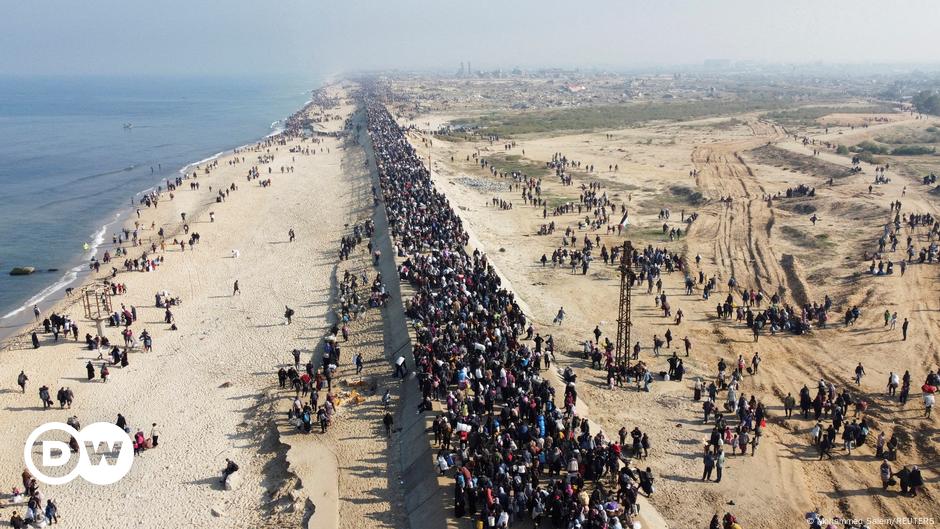While US President latest ideas for the US ownership and US-led reconstruction of the war-battered Gaza Strip were quickly across the Middle East and beyond, it is safe to say that the catchy term “Riviera of the Middle East” will go down in history.
On Tuesday, Trump had made several statements during a joint press conference with Israeli Prime Minister in Washington.
“We’ll own it” he said, referring to Gaza.
He then outlined his steps that aim to turn the war-ridden coastal region into the “
As a priority, Trump sees “dismantling all of the dangerous unexploded bombs and other weapons on this site.”
Then, the US would “level the site and get rid of the destroyed buildings.”
The idea is to “create an economic development that will supply an unlimited number of jobs and housing for the people of the area,” Trump said.
“I envision the world’s people living there,” he said, adding that “people there could live in peace, Palestinians are most we are talking about.”
For Trump, the “potential of Gaza is unbelievable and we have an opportunity to do something that could be phenomenal.”
However, as the Gaza Strip is not an empty plot fit for investment but home to some , Trump once more suggested — without specifying if this was a temporary or permanent idea — that Palestinians should be “relocated outside Gaza where they can live safely.”
Above all, he appealed to Jordan and Egypt to ” and give us the land that they [the Palestinians] need.”
However, Egypt and remain steadfast in their position that their countries will not take in Palestinians from Gaza.
Following Trump’s announcements, both state leaders reiterated on Wednesday that, while their support for the Palestinians was unwavering, so is their rejection of taking in people from Gaza.
Unified Arab stance
“Giving up Egyptian land is considered taboo, especially in view of the resettlement project, which many Egyptians regard as anti-Palestinian,” Stephan Roll from the German Institute for International and Security Affairs said last week.
In an interview in late January, he said that Egypt’s rejectionist stance was based on for the Palestinian quest for statehood.
Meanwhile, Edmund Ratka, who heads the German Konrad Adenauer Foundation’s office in Amman, told DW on Wednesday that “Jordan is not only a very close ally of the United States, it is also dependent on American aid money.”
In his view, Donald Trump’s latest statements have put the Jordanian king in an ahead of their meeting in Washington next Wednesday.
“On the one hand, King Abdullah II has to keep relations with the USA going and, on the other hand, such a population transfer, such a forced resettlement of Palestinians to Jordan, would be something that the king would not actually be able to convey to his own people politically, or only with great effort,” Ratka said.
However, for Ashraf Al-Ashry, the editor-in-chief of the Egyptian newspaper Al-Ahram, it is obvious that “no Arab leader will accept American or pressures to undermine or liquidate the Palestinian cause.”
Instead, Egypt has its to rebuild Gaza, albeit without displacing any Palestinians, he said.
“Jordan’s King Abdullah II and Egypt’s President Abdel Fattah el-Sissi will present their own plan to Donald Trump in the next weeks,” Al-Ashry told DW.
According to him, reconstruction of the Gaza Strip is set to take place over three or four years in various stages.
“It will start with Rafah and the south, continue in the center and City and will conclude in the north,” he said.
“Arab and Gulf countries will contribute a significant amount of money, alongside the European Union, the United Nations Development and Reconstruction Fund, other international organizations and the World Bank,” Al-Ashry said.
In his view, a unified will render the American proposal useless as “it is impractical and unrealistic.”
Questions remain unanswered
Peter Lintl, an associate at the Africa and Middle East Division of the Berlin-based think tank German Institute for International and Security Affairs, also regards Donald Trump’s plans as incomplete.
“While Trump highlighted in a seemingly friendly tone that the people in the region will do better and that mainly Jordan and Egypt should take in people, there are also other obvious questions that remain unanswered,” he told DW.
“What will he do if the Palestinians don’t want to ? Who should propel such a migration and should it be done by force which would equal ethnic cleansing? And what role will the Americans or the Israelis play?” he asked.
In his view, Trump rather announced a way he would prefer things to develop.
“Moreover, the idea that this could pacify the conflict in Gaza is nonsense,” Lintl said.
Following the on Israel on , more than 47,500 people have died in the resulting 15-month-long war which also destroyed much of the coastal strip, according to the latest figures from Gaza’s Hamas-run Health Ministry.
The ministry does not differentiate between civilians and combatants, but the UN and multiple humanitarian organizations consider the casualty numbers broadly reliable.
Israel launched its Gaza operation after the Hamas attacks in southern Israel that killed some 1,200 people.
On Wednesday, the current ceasefire between Israel and Hamas is set to enter the negotiated second out of three phases.
The second phase focuses on the release of the remaining Israeli hostages as well as on the withdrawal of Israeli troops from Gaza.
For Lintl, Trump’s recent announcements could even result in a delay of reconstruction efforts in Gaza as the warring parties could return to the weapons at any time.
Lintl observed that the current ceasefire could grow more fragile if the Palestinian side saw its bargaining power disappear.
Katharina Kroll, Kersten Knipp and Mohamed Farhan contributed to this article.
Edited by: Richard Connor
The post Could Trump’s ‘Riviera of the Middle East’ plan bring peace? appeared first on Deutsche Welle.




